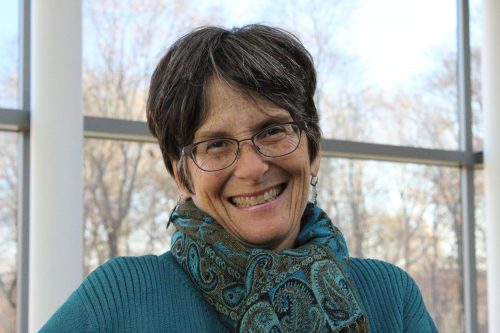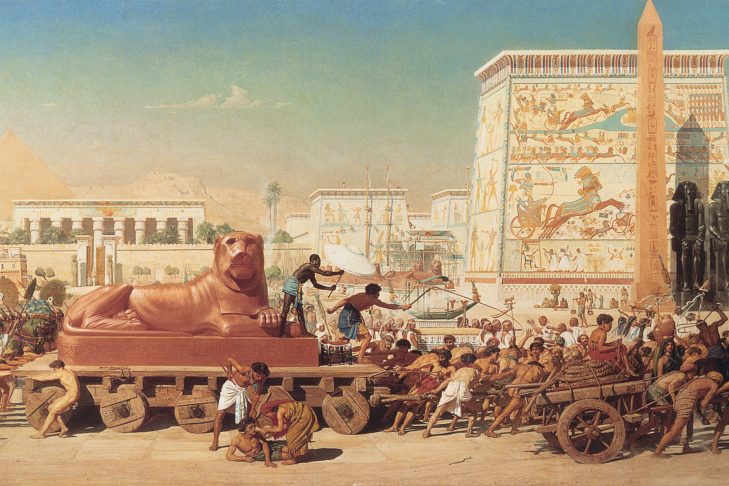The story of our departure from Egypt begins with a cry—the deep, inarticulate cry of pain and longing that rises up from the bellies of the Israelite slaves and ascends to heaven. It is their cry, in this week’s Torah portion, that—after generations of slavery—finally evokes a response from God, and sets the process of liberation in motion. “The Israelites were groaning under their bondage and cried out; and their cry for help from the bondage rose up to God. God heard their moaning, and God remembered the covenant with Abraham and Isaac and Jacob. God looked upon the Israelites, and God took notice of them (Exodus 2:23-25).
The cry of the Israelites at this point in the story is particularly significant when we consider the profound silence that it pierces. For the horror of Pharaoh’s Egypt is epitomized by the effort to stifle, muffle, silence the human cry. The following midrash from Pirke d’Rabbi Eliezer brings that horror into full relief: “Rabbi Akiva says: Pharaoh’s police would strangle the Israelites in the walls of the buildings, between the bricks. And they would cry out from within the walls and God would hear their moaning, as it is said, ‘And God heard their moaning and God remembered the covenant…’” (Exodus 2:24).
In the biblical text itself, there are other intimations of the stifled human cry. The quintessential human cry is the cry of the newborn. Great pains are taken by the women of Exodus to ensure that this cry is not heard, lest it be silenced forever. This is implied in the text when we learn that Yocheved could no longer hide Moses at three months—presumably because there was too great a risk that his cries would be heard. The following midrash from Song of Songs Rabbah elaborates on this poignant image:
“R. Hanan said, ‘What did the chaste and virtuous Israelite women do? They took their infants and hid them in holes [in their houses]. So the wicked Egyptians would take their own young children, bring them into the homes of the Israelites, and pinch their young until they cried. When the Israelite infants in their hiding places heard the Egyptian children cry, they cried with them. Then the Egyptians would sieze the Israelite infants and cast them into the Nile.’”
Pharaoh creates a world in which mothers have to stifle the cries of their own babies, and yet here we also see how irrepressible the cry of life is. An infant hears another infant crying and cannot help but respond with her own cry. Life cries out to itself—it cannot be silenced. In this context, the crying out of the Israelites can be more fully understood as the beginning of our liberation, for it is the irrepressible welling up of life within us that again and again gives birth to hope.
Why is it that God does not intervene to bring an end to the suffering of the Israelites until they cry out? Is God unaware of—or indifferent to—their suffering before this point? This troubling question stands, now as it always has. But part of the answer is suggested by the Chasidic commentator Sefat Emet who writes: “Before this, they were so deep in exile that they did not even feel they were in exile. Now that they understood exile and groaned, a little redemption began.”
The awareness of suffering is the beginning of longing, and longing is the beginning of redemption. To cry is, at some level—however inarticulate—to reach out. It is to take the risk of exposing one’s own lack, and it is to take the risk of asking for help. While the text specifically does not say that the children of Israel cried out to God, we are told that their cries ascended to heaven. It was enough for them to cry out, even without knowing why and to whom, for God to hear them and respond.
Shortly after this moment in the text, Moses encounters God in the wilderness of Midian at the burning bush. They have a dialogue there, which begins with God calling out to Moses, “Moses Moses!” And Moses responds, “Hineini.” Here I am (Exodus 3:4).
An extraordinary midrash from Exodus Rabbah comments on God’s call to Moses in this encounter. “Moses Moses. Here the Hebrew text provides no stop equivalent to a comma between the two occurrences of the name Moses. Why not? This question may be answered by the parable of a man overloaded by an excessively heavy burden, who cries out all in one breath, “Somebody somebody, come quickly, take this load off me!’”
The claim of the midrash is astonishing. God’s emphatic double call to Moses is a cry for help, a cry that echoes the cry of the Israelite people just a few verses earlier. These cries, together, bear the urgent message of radical inter-dependence—for God teaches Moses at the bush that the cry for help does not only link human beings to one another—it also links heaven and earth.
In this midrash God—as it were—takes the risk of acknowledging a lack, a need for help. And in so doing, God teaches Moses, and us, that the suffering of another demands not sympathy but empathy, the recognition of shared vulnerability. God shows Moses that the path to redemption is not a path of autonomy and grand isolation—the burden of liberation must be shared. This is a lesson that Moses—whose career as a leader begins in lonely flight—will struggle with all his life.
Shortly after the Israelites finally leave Egypt, they again find themselves in what seems to be desperate situation, and again they cry out. This time, they stand at the threshold of freedom. They have witnessed great “signs and wonders”; they have survived the final night of passage out of Egypt. But, encamped a three day’s journey out of Egypt, the Israelites find themselves caught between the pursuing Egyptian army and the sea. When they realize they are trapped, they panic: “And they said to Moshe: ‘Was it for want of graves in Egypt that you brought us to die in the wilderness? What have you done to us, taking us out of Egypt?…It is better for us to serve the Egyptians than to die in the wilderness?’” (Exodus 14:11-12).
Moses responds by attempting to reassure them: “Have no fear! Stand by, and witness the deliverance which the Lord will work for you today…The Lord will battle for you; you hold your peace!” (Exodus 14:13-14).
But God responds by admonishing Moses: “Why do you cry out to Me? Tell the Israelites to go forward. And you lift up your rod and hold out your arm over the sea and split it, so that the Israelites may march into the sea on dry ground” (Exodus 14:15-16).
God’s response is fascinating. What, precisely, is the nature of the rebuke? I would like to suggest that Moses has misunderstood what the people need; he has misunderstood the relational imperative of the moment. The people’s cry demands not his piety, but his presence. God will indeed part the seas for the children of Israel to pass through. Moses is right about that. Where he is wrong, God’s response suggests, is in his intuition about what the people need to hear. It is as if God is saying: I’ll take care of the sea, Moses. You take care of the people. Tell them to go forward—in other words, don’t tell them that you have faith in Me, tell them that you have faith in them!
Significantly, God—the God who redeems us from Egypt with a “strong hand and an outstretched arm”—tells Moses to stretch forth his own arm and tell the people to go forward. Why does Moses have to stretch forth his arm? Surely, it is not because he himself possesses magical or supernatural powers; we know it is God, not Moses, who must split the sea.
Moses must stretch forth his arm because, ultimately, the outstretched arm is the response to the human cry. If the cry is one way of reaching out across the chasm between us, the outstretched arm is another. This is what liberation requires, this is what will enable the people to move forward, this is what will transform the waters of despair into the waters of redemption.
This is the greatness of the daughter of Pharaoh, whose compassion earns her the name Batyah, daughter of God. According to a midrash in the Babylonian Talmud, tractate Megillah, the arm of Pharaoh’s daughter “miraculously stretched to sixty amot when she extended her hand to reach for the baby Moses as he lay in a basket in the Nile River.” We are told that Pharaoh’s daughter saw the baby and heard him crying. Her compassion miraculously extends across the vast distances of class and nationality and religion that separate her from the Hebrew child. She is called the daughter of God because she acts in the image of God—extending a strong hand and an outstretched arm to protect this crying infant, the very embodiment of human vulnerability.
This is also what the midwives, Shifrah and Puah, understand deeply, intuitively. Indeed it is the essence of the midwife’s work. Perhaps this is why God Himself is portrayed as midwife in a famous midrash on the Song at the Sea. For the midwife responds to the moans of the woman in labor, the midwife responds to the insistent, robust cry of the newborn child, with strong, skillful hands and a gentle, outstretched arm.
The real-life process of liberation requires no less than this: that we reach out again and again, in spite of the great risks, in spite of the inevitable disappointments—that we reach out to each other, again and again, with strong hands and outstretched arms.
This is the wonder that God performs for us on our journey out of Egypt. This is the miracle that transforms our weeping into song.

Rabbi Sharon Cohen Anisfeld is President-Elect of Hebrew College in Newton Centre. She is the former Dean of the Rabbinical School of Hebrew College. An earlier version of this piece was published in The Women’s Passover Companion (Jewish Lights 2003).
Interested in a possible career in the rabbinate? Read Rabbi Dan Judson’s article “Jewish Lessons on Meaningful Work.” Rabbi Judson teaches history, oversees the professional development program, and serves as the placement director for the Hebrew College Rabbinical School. He has a Ph.D. in Jewish history from Brandeis University.
This post has been contributed by a third party. The opinions, facts and any media content are presented solely by the author, and JewishBoston assumes no responsibility for them. Want to add your voice to the conversation? Publish your own post here. MORE

